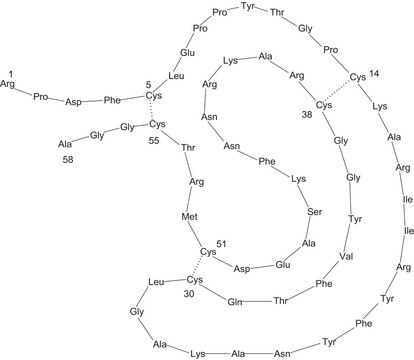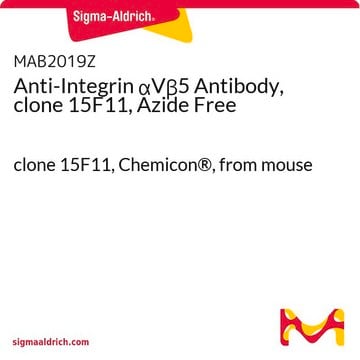MAB1961Z
Anti-Integrin αVβ5 Antibody, clone P1F6, azide free
clone P1F6, Chemicon®, from mouse
Synonym(s):
MAB1961
About This Item
Recommended Products
biological source
mouse
Quality Level
antibody form
purified immunoglobulin
antibody product type
primary antibodies
clone
P1F6, monoclonal
species reactivity
chicken, human
manufacturer/tradename
Chemicon®
technique(s)
flow cytometry: suitable
immunohistochemistry: suitable
isotype
IgG1
suitability
not suitable for immunohistochemistry (Paraffin)
NCBI accession no.
UniProt accession no.
shipped in
wet ice
target post-translational modification
unmodified
Gene Information
human ... ITGAV(3685)
General description
Specificity
Immunogen
Application
Inhibition of attachment of carcinoma and melanoma cells to vitronectin
Immunohistochemistry: for use on acetone or paraformaldehyde fixed tissue. (Staining of formalin-fixed tissues REQUIRES boiling tissue sections in 1mM EDTA, pH 8.0, for 10-20 min followed by cooling at RT for 20 min.)
Immunocytochemistry: for use on human carcinomas, normal epithelium and keratinocytes 1:1500 (Acetone Fixed Only)
Immunoprecipitation
FACS
EIA
Optimal working dilutions must be determined by the end user.
Cell Structure
Integrins
Physical form
Storage and Stability
Analysis Note
Epithelium, keratinocytes
Other Notes
Legal Information
Disclaimer
Not finding the right product?
Try our Product Selector Tool.
recommended
Storage Class Code
12 - Non Combustible Liquids
WGK
WGK 2
Flash Point(F)
Not applicable
Flash Point(C)
Not applicable
Certificates of Analysis (COA)
Search for Certificates of Analysis (COA) by entering the products Lot/Batch Number. Lot and Batch Numbers can be found on a product’s label following the words ‘Lot’ or ‘Batch’.
Already Own This Product?
Find documentation for the products that you have recently purchased in the Document Library.
Our team of scientists has experience in all areas of research including Life Science, Material Science, Chemical Synthesis, Chromatography, Analytical and many others.
Contact Technical Service






